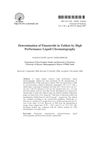 13 citations,
January 2007 in “E-journal of Chemistry”
13 citations,
January 2007 in “E-journal of Chemistry” Found accurate way to measure finasteride in tablets.
 8 citations,
September 2008 in “Medical Hypotheses”
8 citations,
September 2008 in “Medical Hypotheses” The paper suggests that hair loss might be caused by skull growth, not just DHT's effect on hair follicles, and calls for more research.
 29 citations,
February 2007 in “Hormone and metabolic research”
29 citations,
February 2007 in “Hormone and metabolic research” Blocking the androgen receptor in skin cells reduces their growth response to male hormones, suggesting a possible treatment for skin conditions linked to androgens.
 29 citations,
July 2004 in “Pharmacology, Biochemistry and Behavior”
29 citations,
July 2004 in “Pharmacology, Biochemistry and Behavior” Finasteride reduces alcohol withdrawal effects, especially in female mice.
 6 citations,
March 1999 in “Seminars in Cutaneous Medicine and Surgery”
6 citations,
March 1999 in “Seminars in Cutaneous Medicine and Surgery” Scalp biopsies are essential for accurately diagnosing alopecia areata.
 21 citations,
January 2003 in “Skin pharmacology and physiology”
21 citations,
January 2003 in “Skin pharmacology and physiology” Different skin cells process testosterone differently, and certain drugs can change this process, possibly helping treat acne and hair loss.
 June 2023 in “Trichology and cosmetology:”
June 2023 in “Trichology and cosmetology:” Ageratum Conyzoides, when taken orally, can effectively reduce hair loss and improve hair growth.
 11 citations,
January 2015 in “Current problems in dermatology”
11 citations,
January 2015 in “Current problems in dermatology” The conclusion is that treatments like finasteride and minoxidil can prevent baldness progression and improve hair density, but more research is needed on other therapies.
 185 citations,
March 2011 in “The Journal of Sexual Medicine”
185 citations,
March 2011 in “The Journal of Sexual Medicine” Finasteride for hair loss can cause long-lasting sexual side effects like low libido and erectile dysfunction.
 6 citations,
March 2018 in “Journal of Medicinal Food”
6 citations,
March 2018 in “Journal of Medicinal Food” Chicken egg yolk peptides can promote hair growth by increasing a specific growth factor.
 11 citations,
April 2013 in “Journal of Agricultural and Food Chemistry”
11 citations,
April 2013 in “Journal of Agricultural and Food Chemistry” Monascus helps prevent baldness, prostate issues, and may be a natural alternative to medications.
 30 citations,
March 2011 in “Australasian Journal of Dermatology”
30 citations,
March 2011 in “Australasian Journal of Dermatology” Flutamide improves female hair loss when other treatments fail, but may cause liver toxicity.
 2 citations,
December 2019 in “Neurobiology of Stress”
2 citations,
December 2019 in “Neurobiology of Stress” Changing allopregnanolone levels in baby rats affects their adult behavior and alcohol use.
 18 citations,
June 2010 in “Current medicinal chemistry”
18 citations,
June 2010 in “Current medicinal chemistry” Treating hirsutism in women often requires a mix of medications and cosmetic methods for best results.
 9 citations,
September 2000 in “Obstetrics and gynecology clinics of North America”
9 citations,
September 2000 in “Obstetrics and gynecology clinics of North America” Hirsutism causes significant psychological distress in women.
 15 citations,
March 2014 in “Molecular Medicine Reports”
15 citations,
March 2014 in “Molecular Medicine Reports” α-spinasterol from Melandrium firmum can help reduce prostate enlargement.
 December 2024 in “International Journal of Drug Delivery Technology”
December 2024 in “International Journal of Drug Delivery Technology” A gel with dutasteride and 10% garlic extract may effectively treat male pattern baldness.
 42 citations,
March 2010 in “Endocrinology”
42 citations,
March 2010 in “Endocrinology” Mice with human gene experienced hair loss when treated with DHT.
 8 citations,
September 2017 in “Journal of Natural Medicines”
8 citations,
September 2017 in “Journal of Natural Medicines” Applying an extract from Perilla frutescens helps hair grow and fights the effects of hair loss hormones.
 21 citations,
January 1991 in “Dermatology”
21 citations,
January 1991 in “Dermatology” Men with male pattern hair loss have different levels of certain hormones compared to men without hair loss.
August 2017 in “Revista de la Facultad de Ciencias Médicas (Quito)/Revista de la Facultad de Ciencias Médicas” Early baldness in men may indicate a higher risk of prostate cancer.
 26 citations,
November 1993 in “Progress in Neuro-psychopharmacology & Biological Psychiatry”
26 citations,
November 1993 in “Progress in Neuro-psychopharmacology & Biological Psychiatry” Treatment during development affects hormone balance and sexual behavior in male rats.
 169 citations,
August 2004 in “Baillière's best practice & research. Clinical obstetrics & gynaecology/Baillière's best practice and research in clinical obstetrics and gynaecology”
169 citations,
August 2004 in “Baillière's best practice & research. Clinical obstetrics & gynaecology/Baillière's best practice and research in clinical obstetrics and gynaecology” Lower doses of treatments for hirsutism and acne in PCOS are effective and cause fewer side effects.
 August 1994 in “Journal of dermatological science”
August 1994 in “Journal of dermatological science” Different substances affect hair and skin cell growth in various ways.
13 citations,
January 2008 in “Springer eBooks”  11 citations,
January 2001 in “Cambridge University Press eBooks”
11 citations,
January 2001 in “Cambridge University Press eBooks” Androgens can cause hair growth in some areas but hair loss on the scalp.
![Synthesis of 5,6,6-[2H3]Finasteride and Quantitative Determination of Finasteride in Human Plasma at Picogram Level by an Isotope-Dilution Mass Spectrometric Method](/images/research/0026b639-99a8-455a-a986-c39aa65abfa9/small/2087.jpg) 20 citations,
December 1995 in “Journal of Chromatography B: Biomedical Sciences and Applications”
20 citations,
December 1995 in “Journal of Chromatography B: Biomedical Sciences and Applications” Accurate method measures finasteride levels in human plasma using gas chromatography-mass spectrometry.
 50 citations,
July 1996 in “Fertility and Sterility”
50 citations,
July 1996 in “Fertility and Sterility” Finasteride effectively treats hirsutism in women, but more research needed for long-term results.
 23 citations,
January 2008 in “Clinics in dermatology”
23 citations,
January 2008 in “Clinics in dermatology” Diet changes can help reduce acne by limiting certain hormones.
 143 citations,
October 1996 in “Dermatologic Clinics”
143 citations,
October 1996 in “Dermatologic Clinics” Too much androgen can cause hair loss; finasteride may help.

























![Synthesis of 5,6,6-[2H3]Finasteride and Quantitative Determination of Finasteride in Human Plasma at Picogram Level by an Isotope-Dilution Mass Spectrometric Method](/images/research/0026b639-99a8-455a-a986-c39aa65abfa9/small/2087.jpg)


